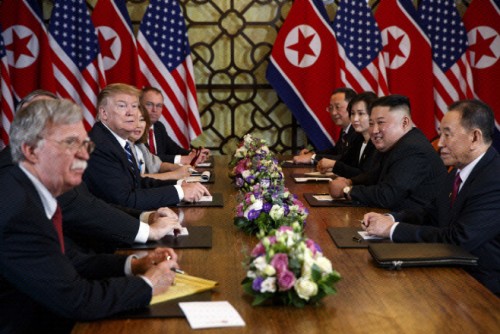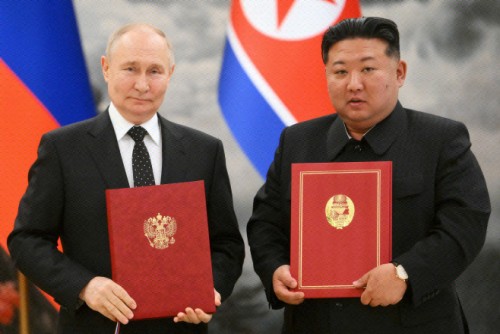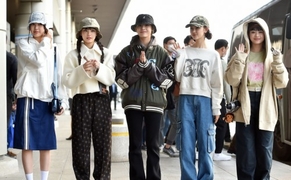 |
| U.S. President Donald Trump and North Korean leader Kim Jong-un attend an expanded session of their second summit in Hanoi, Vietnam, on February 28, 2019. / AP-Yonhap |
President Donald Trump is reportedly willing to resume letter diplomacy with North Korean leader Kim Jong-un, though prospects for a broader revival of U.S.-North Korea dialogue remain uncertain.
At a June 11 press briefing, White House Press Secretary Karoline Leavitt addressed a report by NK News claiming that North Korean officials in the U.S. refused to accept a letter from President Trump. “The president remains receptive to exchanging letters with Kim Jong-un,” Leavitt said. “He still hopes to build on the progress made during the 2018 Singapore summit.”
While Leavitt declined to comment on any specific communication, her response was interpreted as neither denying nor confirming the NK News report. The outlet said officials at North Korea’s UN mission in New York declined to receive the letter from Trump.
Trump himself had said on March 31 that he intended to “reach out” to North Korea “sometime in the near future,” noting his continued “very good relationship” with Kim and saying, “We are in communication.”
The two leaders famously met three times—in Singapore in June 2018, in Hanoi in February 2019, and at the DMZ in June 2019—to discuss denuclearization and sanctions relief, but the talks yielded no concrete outcomes.
 |
| Russian President Vladimir Putin and North Korean leader Kim Jong-un hold a treaty signed during their summit at the Kumsusan State Guesthouse in Pyongyang on June 19, 2024. / Reuters-Yonhap |
Despite Trump’s return to the White House in January, there has been little visible effort to revive diplomacy with Pyongyang. Analysts point to North Korea’s deepening military and economic ties with Russia as a major factor. Kim’s growing alignment with President Vladimir Putin, including the supply of weapons for the Ukraine invasion and exchanges of missile technology, has reduced Pyongyang’s incentive to prioritize relations with Washington.
On June 9, U.S. military outlet The War Zone reported comments from Ukraine’s top military intelligence chief Kyrylo Budanov, who said North Korea and Russia had reached an agreement to manufacture Iranian-style drones—like the Shahed-136—on North Korean soil, including Russian models such as the “Garpiya” and “Geran.”
Meanwhile, American political circles and media outlets have shown far less interest in U.S.-North Korea diplomacy than during Trump’s first term. Most U.S. media ignored Leavitt’s remarks, with only The Times (UK) and Reuters offering detailed coverage.
The Times quoted experts who said Kim is far less motivated to engage with the U.S. than in 2018. With economic lifelines from China and military aid from Russia in exchange for weapons, North Korea’s dependency on the U.S. has waned.
Andrei Lankov, a professor at Kookmin University, told NK News that “Kim Jong-un needs Trump far less than he did in 2018 or 2019,” adding that while North Korea may still be open to negotiations, “any new deal would be far less appealing to the U.S. than what was offered and rejected in 2019.”
John Bolton, former U.S. National Security Advisor, wrote in his memoir The Room Where It Happened that Kim had offered to dismantle the Yongbyon nuclear complex in exchange for sanctions relief, but Trump rejected the offer, demanding North Korea also surrender its long-range missiles capable of striking the U.S. homeland—a proposal Kim refused, causing the talks to collapse.
Most Read
-
1
-
2
-
3
-
4
-
5
-
6
-
7





















